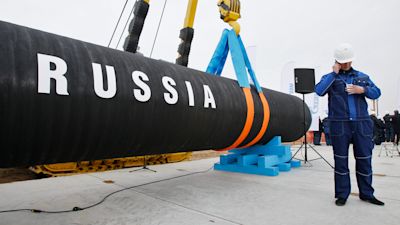Nord Stream 1 can't reopen due to 'malfunctions', says Russian gas firm Gazprom

Callum Watkinson reports on how Russia's actions in Ukraine are affecting the cost of living in the UK
Russian energy giant Gazprom has said it cannot re-open Nord Stream 1, a key gas pipeline that connects to Germany, because of "malfunctions".
The state-run company made the announcement hours after the G7 agreed to cap Russian crude oil and petroleum products, and shortly before Gazprom was due to recommence deliveries on Friday.
It said Nord Stream 1, which carries natural gas from western Russia to Germany, will not work unless a faulty turbine is fixed.
Early on Wednesday, Gazprom completely halted the flow of gas through Nord Stream 1, in line with an earlier announcement, adding that the stoppage would last for three days.
According to the firm it had now identified oil leaks from four turbines at the Portovaya compressor station - at the Russian end of the pipeline - including the sole operational one.
It claimed to have received warnings from Russia’s industrial safety watchdog that the leaks “do not allow for safe, trouble-free operation of the gas turbine engine".
“In connection with this, it is necessary to take appropriate measures and suspend further operation of the… gas compressor unit in connection with the identified gross [safety] violations,” the company said.
Klaus Mueller, the head of Germany's Federal Network Agency, slammed Gazprom's decision to keep Nord Stream 1 switched off for now.
In a tweet he said it increases the significance of new liquefied natural gas terminals, which Germany plans to start running this winter, gas storage and “significant needs to save” gas.
Mr Mueller added it is “good that Germany is now better prepared, but now it comes down to everyone".
Want a quick and expert briefing on the biggest news stories? Listen to our latest podcasts to find out What You Need To know
Germany’s economy ministry said it had “taken note” of Gazprom’s latest announcement and wouldn’t comment on it directly, and continued efforts to reduce the country’s reliance on Russian energy imports.
Charles Michel, the president of the European Council, which comprises the heads of EU states, said Gazprom's move was "sadly no surprise".
He added: "Use of gas as a weapon will not change the resolve of the EU. We will accelerate our path towards energy independence."
The latest Nord Stream shutdown stoked fears of winter gas shortages that could help tip major economies into energy rationing programmes.
In recent weeks, Nord Stream 1 has been running at only a fifth of its total capacity.
Since the middle of June, Gazprom has cut supplies through the pipeline, blaming delays to the delivery of a turbine which had been sent to Canada for repair.
Canada has since allowed the turbine's delivery to Germany, but it has yet to be delivered back to Russia.
Until recently Russia has accounted for around a third of Germany's natural gas supplies and so the country has been keenly affected by Gazprom's insistence on conducting maintenance works.